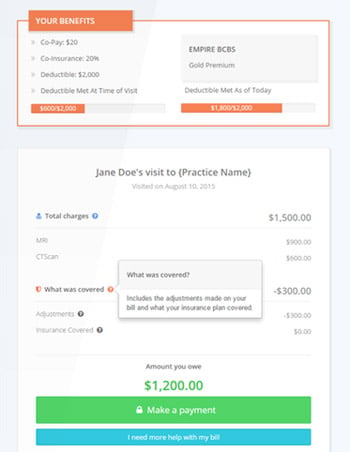Today we’re interviewing Jake Myers, Co-Founder and CEO of MedPilot. He’s been in the healthcare space for many years, specializing in Revenue Cycle Management. Jake’s experience was in taking hospitals out of bankruptcy and restructuring patient and insurance collections to optimize reimbursement. He advises and is involved in many companies in the healthcare and health/wellness space. Here’s what Jake had to say…
How would you pitch your company?
MedPilot helps healthcare billing departments improve the collection of patient balances, while reducing manual administrative tasks involved in the revenue cycle. With healthcare costs shifting to patients due to the increasing use of high deductible health plans, and reimbursements increasingly determined by patient satisfaction, an efficient and low friction solution for collecting on these receivables provides more value than ever.
Our customer service and payments technology engages patients through automated but personalized communication and facilitates payment plans and financial settlements based on individual circumstances to successfully resolve these balances.
What sets you apart from competitors?
Our expertise in direct marketing allows us to bring a data-driven approach to communicating with patients. We leverage user demographics and behavior, as well as performance analytics, to provide communication channels and customized content that connect patients securely to the billing process. We believe that in order to maximize collections and minimize patient frustration, you must optimize the performance of your outreach.
We are also the first in the space to connect the digital outreach and platform analytics to the manual back office workflow, thus reducing cost and increasing productivity. The days of huge call centers dialing for dollars are slowly dying out. They expend a huge amount of human capital that produces too much annoyance relative to their results from patients. We’ve developed the tools to bring data-driven communication insights to an industry that hasn’t previously benefitted from them.
Lastly, we are very fortunate to have landed a partnership with Retrieval Masters. On top of them being one of the nation’s leading agencies, managing over 1 billion in annual receivables, they are extremely focused on bringing a tech-forward and patient-friendly approach to the industry. We were very attracted to them because of their ability to utilize advanced and intelligent data analytics to optimize collection results.
What’s your business model?
We are currently working with both healthcare providers and third-party billing and collection companies. We have two business models at the moment depending on our client:
- Transaction Fee
- Subscription/software fee based on account volume
Where do you see the company going from here?
 Healthcare is constantly evolving, especially with continued improvement and use of healthcare-focused technologies. While we focus on and expand our own areas of expertise, we also aim to offer greater value by integrating and complementing other healthcare financial technologies as they emerge.
Healthcare is constantly evolving, especially with continued improvement and use of healthcare-focused technologies. While we focus on and expand our own areas of expertise, we also aim to offer greater value by integrating and complementing other healthcare financial technologies as they emerge.
Where do you see the mHealth industry going?
Nine out of ten American adults own a cell phone, and over 60 percent of them prefer to open their emails first on them. Now this isn’t groundbreaking news for anyone. You can walk down the street and see everyone buried in their phones. So why does the healthcare industry still predominantly rely on letters and phone calls to speak with us?
This is why we designed MedPilot for mobile first. We think that interacting with patients regarding financial matters can happen much more efficiently in a digital manner. Millennials may not check the mailbox at the end of their driveway every day, but they do check their phone over 40 times a day. Why not reach them there?
How long are we from seeing modern mHealth technologies going mainstream?
Mobile technologies are already here in a big way. There is no question that an increasing number of healthcare services will migrate to mobile platforms in the very near future. Mobile is at the forefront of the ever changing healthcare industry. Providers and software vendors have to adapt to the times or they will quickly find themselves in the backroom with dial-up modems and VHS tapes.


